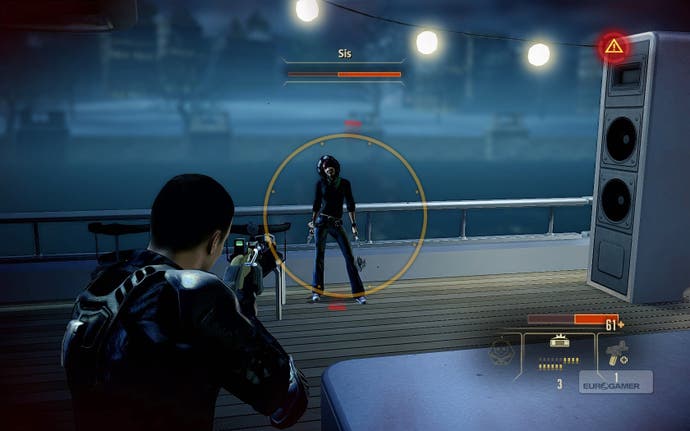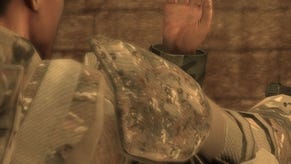Alpha Protocol
Diamonds take forever.
It's also impossible to tell, at this stage, what effect your choices have in these conversations. Taking different approaches each time we played the hands-on missions changed the other character's immediate response dialogue, but we still ended up playing the same levels afterwards.
We're told that the mission structure itself will be the same for each player, but that they might have different outcomes depending on the choices you make - at one stage, Thorton only has time to recover half of the data from a hard drive, and what you recover changes your bargaining power with Thorton's contacts.
You definitely do have an impact on how the game actually plays, though, depending on how you choose to develop your character. Playing the same mission three times with different character builds, it's easy to see that it really is possible to approach Alpha Protocol in quite drastically different ways.
Taking the stealth approach involves pumping all your stat points into hand-to-hand combat and avoiding detection. Stealth-specialised characters have an Awareness skill that puts arrows on the screen representing where enemies are and whether they're aware of your presence. It's easier to sneak up behind them, and there's a usable Shadow Running skill that makes you effectively invisible. Pressing the d-pad to the right brings up your skills wheel, allowing you to deploy a sharp-shooting or stealth-enhancing ability at crucial moments.
In the mission provided for the hands-on, which was towards the latter third of the game, this meant picking locks and using a silenced pistol to work an alternative route around the level without being detected, either incapacitating enemies with a punch to the throat or a chokehold or avoiding them entirely. Unfortunately, triggering an alarm usually led to instant death - it wasn't the most forgiving approach, but it was rewarding.
Playing with a soldier build, things were much, much simpler. With high hit points and SMG skill, it was entirely plausible to simply run into rooms and mow everything down without even having to bother with cover, using aggro and rapid-fire skills for quick boosts. With a tech-focused character, it was easier to hack security cameras and bypass the infuriating hacking mini-games with an EMP. There was also more inventory space for gadgets, like a radio mimic to call off an alarm or a sound generator to distract sentries.

The game relies on a mixture of active skills, which you select from a menu, and passive skills that lower your detection rates or make mini-games easier. Tech characters, for instance, sometimes avoid being seen even if they walk into the path of a camera; stealth characters might be given a few extra seconds of leeway before an enemy triggers the alarm.
Where you put your stat points, then, really does determine how you can play the game. Sadly it also means that players will necessarily pigeonhole themselves into a particular approach. It's literally impossible to change tactics for later missions, because your stats won't allow it - you can't suddenly roll out with a shotgun for a level that's giving you trouble if you've been pouring all your points into stealth abilities and pistols. Given that the stealth approach is way, way harder than the others, it's easy to see how this inflexibility might become problematic.
There's a great deal of tension between form and content in Alpha Protocol, and though this makes it interesting, it also makes it conflicted. It's neither a conventional third-person shooter nor a story-driven RPG; it's clear that the plot was written around the mission structure, not the other way around. It's impossible to tell from a few hours with the game how your choices will influence the way that events unfurl.
Given that Alpha Protocol is too idiosyncratic to make its name as a pure shooter, it's these aspects of choice and consequence that will make the difference.
Alpha Protocol is due out for PC, PS3 and Xbox 360 on 28th May.








